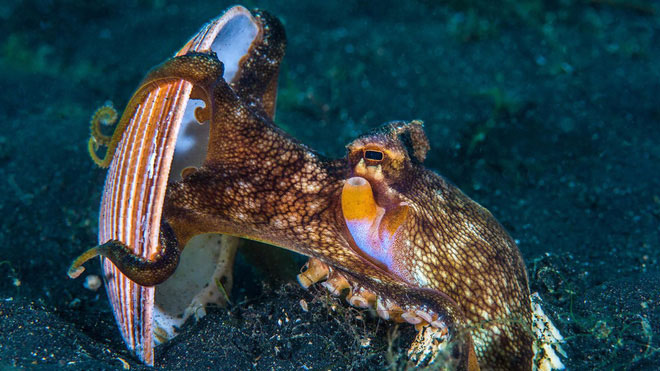The genius of the ocean? Please call the octopus name!
Referring to the intelligence of animals living in the ocean, people often think of dolphins or whales. But there is another marine creature that has a remarkable IQ, it is octopus.
In 2016, an uncle's defection surprised the scientists.
Taking advantage of the fact that the staff forgot to close the tank lid, the octopus had suddenly climbed out of the tank, passed a room to the open manhole, and forced himself to move in a 50m long pipeline to return to the great positive.
The successful defection of the octopus that year proves the amazing intelligence of this creature.
1. Know how to use the tool
Jennifer Mather, a biologist at Lethbridge University in Canada, observed an interesting phenomenon. To ensure their safety, the octopus moves the nearby rocks by itself to create a fence around the shelter, then peacefully falls asleep.

Octopus knows how to build a nest with shells.
This proves that they have the ability to predict future possibilities and from there to create their own plans.
Their use of stone to build walls can be considered a tool use. However, this is still controversial because many people think it is just instinctive action.
In 2009, some scientists at the Melbourne Museum (Australia) observed many octopus digging coconut shells from the bottom of the ocean, then arranged and moved them on a 20m long road to build shelter. for myself.
This seems to be a more convincing evidence, suggesting that this species can use tools to serve its life.
2. Play

As an animal with high awareness, new octopus has the ability to play.
Only highly aware animals have the ability to play, and it is more likely that octopus belongs to one of them. Jennifer Mather and her colleagues conducted an experiment to prove this.
They put 8 large octopus in a water tank, and gave them some empty plastic bottles. At first, they put these bottles in their mouths to check if they were food, then throw them away.
However, after repeating this experiment, two of the eight octopuses started blowing water rays into the bottle before throwing. The water brought those bottles of water back to the octopus, and then they continued to play.
3. Has its own personality
Scientists believe that each octopus has its own personality.
This is also demonstrated by an experiment in which 44 octopus are locked into a container. During the two weeks, they interacted by touching them lightly with a lab brush, and giving them delicious crabs for dinner.

Octopuses have different emotions and actions based on the personality of each individual.
As a result, up to 19 different reactions were recorded. Some children reacted passively, but also had more active and curious children. This proves that octopuses have different emotions and actions based on the personality of each individual.
Researchers even hypothesize that octopus also inherits their personality for the next generation.
4. Disguised master
Some octopus species can also change color, shape, and even movement to deceive predators. Research shows that they can mimic at least 15 different species.
5. Know thinking to solve problems
Octopuses can think of different methods to achieve their goals, and if this fails, they will adopt a different plan. This becomes a huge advantage every time they hunt.
6. Knowing and learning

Octopuses have the ability to memorize paths and apply them to necessary circumstances.
In a small experiment, two octopus were placed in a maze. After 5 times to find the way out, octopus can easily pass the maze without any obstacles.
This shows that they have the ability to memorize paths and apply them to the necessary circumstances.
7. And their brains also have many things in common with humans
The octopus's brain structure is also quite complicated. They have a similar vision to humans when their eyes complement and support each other.
This feature is often seen in high-level organisms where two halves of the brain take on different tasks. It is also relevant and complementary to language functions.

Octopus also stores memories in the same way as humans.
They also store memories in a way similar to humans, so memories last longer and brain cell connections are enhanced.
More than half of the 500 million octopus neurons are in its legs. This means that 8 pins can act independently or work together easily.
In other words, unlike humans who use the brain as a nerve center, the octopus's intelligence is broken down on a wider network that is almost like the Internet.
- Octopus - one of the smart species does not use the brain
- Detecting octopus 'super small' at sea
- Training octopus into the world's first photographer
- Video: Found strange octopus near Hawaii
- The little-known dark secret of the octopus has now been discovered by science
- Scientists absolutely warn against raising octopus
- The video of the octopus escapes the egg bag causing fever in the online community
- Octopus species have an odd sex life
- 'Octopus city' under the sea floor of Australia
- Miraculous stealth of octopus in the Caribbean Sea
- Giant octopus is not mated because it is easy to eat mates
- Lightning-fast octopus is amazing
 Surprised: Fish that live in the dark ocean still see colors
Surprised: Fish that live in the dark ocean still see colors Japan suddenly caught the creature that caused the earthquake in the legend
Japan suddenly caught the creature that caused the earthquake in the legend A series of gray whale carcasses washed ashore on California's coast
A series of gray whale carcasses washed ashore on California's coast Compare the size of shark species in the world
Compare the size of shark species in the world